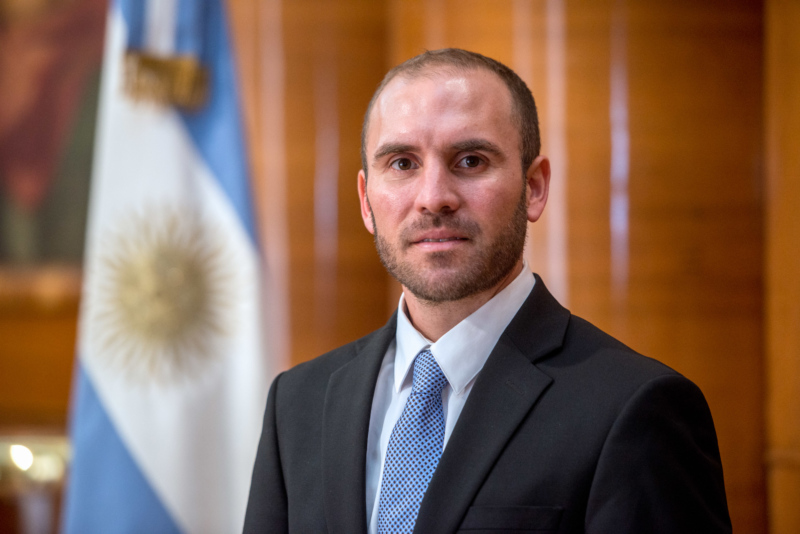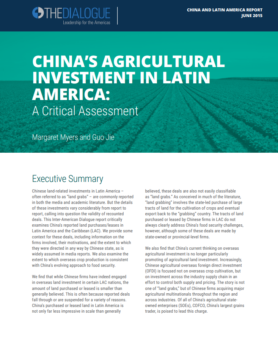The Nationalism of Cristina Fernández de Kirchner
Argentine President Cristina Fernández has increased her appeals to nationalist sentiment to build domestic political support.
A Daily Publication of The Dialogue
Argentina’s economy will grow by at least 7 percent this year, Economy Minister Martín Guzmán said March 16. The figure would mark a better-than-expected recovery following three years of recession in the South American nation. What are the most important factors and sectors driving a stronger recovery in Argentina this year? What potential headwinds might Argentina’s economy face in the year ahead? Will higher economic growth translate into more jobs and better living conditions for Argentines, of which nearly half were living in poverty last year amid the coronavirus pandemic?
Jorge Argüello, Argentina’s ambassador to the United States: "Amid a pandemic, the world today is surrounded by global uncertainty. However, Argentina invested in strengthening its health care systems and acquired knowledge that it was able to turn into protocols that—if the spread of the virus accelerates—will allow us to avoid extreme health measures that could halt or reverse the emerging economic recovery. In the context of this uncertainty and huge fiscal efforts to mitigate the consequences of the pandemic, it will be a challenge to achieve access to financing and make it sustainable, especially in the case of middle-income countries. The government is implementing diverse measures to promote exports in sectors perceived as strategic. In order to remain on track toward sustainable, inclusive and federal development of Argentina, the government is negotiating promotion and cooperation agreements with strategic sectors due to their importance in generating foreign exchange. This includes the automotive sector, mining, agribusiness, oil and gas, and the knowledge economy. It is estimated that in five years, these policies will generate a growth of 40 percent in exports for the agro-industrial sector, 100 percent in the case of the auto- motive sector and the knowledge economy, and more than 120 percent in mining, gas and oil. This increase would generate an income of $32 billion in foreign currency and the creation of more than 1.1 million formal jobs. Economy Minister Martín Guzmán spoke about these and other matters during his recent visit to Washington, where he held face-to-face meetings with Kristalina Georgieva and the IMF team that is working on negotiating a new program with Argentina. Once again, it represented an opportunity to make progress in reaching mutual under- standings that are part of a constructive dialogue, as happened in previous meetings regarding these ongoing negotiations. The IMF also appreciated this dialogue; in a statement issued March 25, it recognized that ‘the Argentine authorities and the IMF team made progress in defining some key principles that could underpin an economic program to help address Argentina’s near- and medium-term challenges."
Kezia McKeague, director at McLarty Associates: “Stimulus programs in the United States and Europe, coupled with a loosening of pandemic mitigation measures, have created a better-than-expected climate for emerging markets. Most importantly for Argentina, rising prices for soybeans and other commodities have provided an important source of scarce foreign revenue, reducing the risk of an imminent currency crisis. Nevertheless, sovereign bond prices— at their lowest rate since their issuance date—reflect investors’ pessimism about double-digit unemployment, inflation projected to reach 50 percent and uncertainty about the timing of a needed debt restructuring with the International Monetary Fund. While the surge in agricultural exports has given the government breathing room, it has also alleviated pressure to implement changes to the macroeconomic framework. In the run-up to midterm elections scheduled for October, the dominant faction of the diverse governing coalition remains committed to tight capital controls, reliance on foreign currency transfers from the central bank to finance the wide fiscal deficit and a policy mix of price controls, import restrictions and subsidies. These measures will do little to curb inflation or the flight of capital and people—nor will they be conducive to concluding a deal with the IMF, despite the imperative to delay a heavy repayment schedule. Indeed, it has become increasingly clear that the government is decelerating the IMF negotiations in order to avoid political costs in an election year. Yet kicking the can down the road is a suboptimal strategy, as imbalances mount and the risk of a disorderly adjustment grows. Historically, the primary obstacle to jumpstarting the Argentine economy has been political—and it will remain so this year.”
Daiana Fernández Molero, former undersecretary of microeconomic programming in Argentina’s Treasury Ministry: “Argentina's economy will grow 6-7 percent in 2021. Unfortunately, this growth is a rebound from 2020’s 10 percent contraction—it’s not built on solid ground and will be short-lived. Why? First, the pandemic remains poorly managed. In 2020, Argentina endured one of the world’s longest lockdowns, causing great damage to the economy without achieving results at the health level (accumulated deaths per million reached 1,215, one of the highest in the world). This year finds Argentina with few vaccines and no plan to effectively administer the scant doses (only 1.4 percent of the population has been vaccinated). This lack of vaccination, coupled with the coming winter, will have a negative impact on the economy. An agreement with the IMF seems unlikely. While Finance Minister Guzmán was meeting with Kristalina Georgieva, Vice President Cristina Kirchner stated publicly that Argentina was incapable of paying its debts. Reaching a deal with the IMF goes against the image this government needs to portray to its base in a year of mid-term elections. Finally, medium-term growth determinants are disappointing: almost all the competitiveness reforms (tax reductions and fiscal consolidation, among others) that the previous government implemented have been rolled back. This, combined with investor distrust, will limit investment and job creation. Nevertheless, on the demand side, the government will stimulate the economy before the October elections to spur private consumption. On the supply side, the construction and agricultural sectors will probably be the best performers. In short, this year Argentina will see high but unsustainable growth and a meager recovery."
Mariana Zepeda, Latin America research analyst at FrontierView: “Although Argentina’s GDP will gradually recover in 2021 (our current forecast assumes a 4.7 percent rebound), driven by the Covid-19 vaccination rollout, public investment and high commodity prices, the country will face significant internal and external headwinds. On the domestic front, contending with the aftermath of the Covid-19 shock will be an onerous task, particularly as the government’s tough fiscal situation forces it to lift measures previously implemented to cushion the blow of the pandemic. For instance, the current ban on layoffs has shielded the country from experiencing the pandemic’s full-blown impact on the labor market, but it is unsustainable and likely to lead to bankruptcies and further structural damage down the line. Argentina’s debt situation remains extremely challenging. With close to $20 billion in IMF debt coming due in 2022, government efforts to delay an IMF agreement until after the October legislative elections are risky, to say the least. While an export-led recovery is on the horizon, particularly given soaring soy prices, Argentina will still have to contend with a deepening fiscal deficit and dwindling international reserves that will weigh on its recovery. That is not to say that exports won’t benefit the economy; on the contrary, rising soy prices will likely allow the country to avoid a disorderly peso depreciation in 2021. However, Argentina will have to contend with a deteriorated labor market, stagnant wages and rising informality, eroding Argentines’ purchasing power (particularly among lower-income deciles, which the pandemic has affected the most). A revival of default fears in this context will severely limit Argentina’s ability to continue to mitigate the economic aftermath of the pandemic, ultimately leaving citizens significantly worse off.”
 The Latin America Advisor features Q&A from leaders in politics, economics, and finance every business day. It is available to members of the Dialogue’s Corporate Program and others by subscription.
The Latin America Advisor features Q&A from leaders in politics, economics, and finance every business day. It is available to members of the Dialogue’s Corporate Program and others by subscription.
Argentine President Cristina Fernández has increased her appeals to nationalist sentiment to build domestic political support.
In 2014, remittances to Latin America and the Caribbean grew 4%, reaching at least $62.3 billion.
China is looking for new agricultural investment opportunities in Latin America, but not necessarily for large tracts of land.
 Guzmán // File Photo: Argentine Government.
Guzmán // File Photo: Argentine Government.

